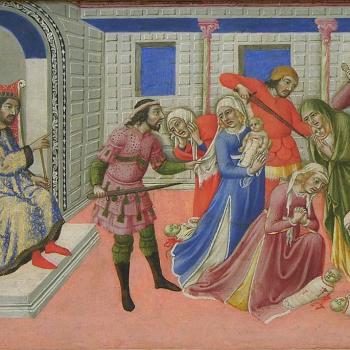
Paul was upset to see Christians fighting against each other, for he saw that it could and would bring not only discord, but actual division within the church. He saw Christian unity being divided up into various factions. Christians were becoming, as it were, rivals with each other. They fought and argued with each other over petty differences of opinion or practice. Many became followers, not just of Christ, but of their favored apostles or leader, centering around them more than Christ and the unity Christ wanted them to have. Paul understood that he was, in some ways, a part of the problem, as many came to lift him up above everyone else. He hoped he could prevent the church from fracturing off into different little groups by exhorting the faithful to look beyond such rivalry and to find what it is which could and should bring them together as one: Christ. Indeed, he said one of the points of Christianity is that the church was meant to draw people together, to reestablish the original, integral unity of humanity which it had lost thanks to sin: “I appeal to you, brethren, by the name of our Lord Jesus Christ, that all of you agree and that there be no dissensions among you, but that you be united in the same mind and the same judgment” (1 Cor. 1:10 RSV).
That ideal, sadly, will not be lived out in its fullness until the eschaton. People will fight against each other for all kinds of reasons, and once a fight starts, it can be difficult for whatever rifts it establishes to be healed. Paul, as much as he understood what Christ wanted, could become quite quarrelsome with others, letting his worst habits get the best of him. That is, while he worked for Christian unity, he also did things which helped cause it to falter. While Christ tells us to love each other, to be forgiving and merciful to each other, we see concupiscence often leads us astray, making it difficult to do what we know we should do. Christians fight against each other. Christians take sides in those fights, creating through them various centers of unity outside of Christ himself, which is why, then, Christians end up divided against each other. Paul wrote with the hope to put a stop to this:
For it has been reported to me by Chloe’s people that there is quarreling among you, my brethren. What I mean is that each one of you says, “I belong to Paul,” or “I belong to Apollos,” or “I belong to Cephas,” or “I belong to Christ.” Is Christ divided? Was Paul crucified for you? Or were you baptized in the name of Paul? (1 Cor. 1:11-13 RSV).
Paul didn’t want to be a leader of a faction within Christianity. He didn’t want to pit himself against the rest of the church, and in doing so, cause rifts which could not be healed. He wanted Christians to remember their focus should be with Christ. He wanted everyone to remember their faith is in Christ, that their membership in the church was through their unity with Christ. This was not to say, once conflicts emerged, they should be relativized as if they were nothing. Those who would seek personal gain, or those who would cause conflict by promoting a terrible theological opinion which they wanted to be promoted over and against the faith of the church (that is, those who promote heresy), need to be properly corrected. However, in doing so, Christians should keep in mind that the basis of the faith lies with Christ, and that Christ wanted Christians to come together in and with love. When dealing with division in the Christian faith, our goal should be to restore unity. We should avoid acting in such a way that we needlessly reify division in the church. This is why ecumenism is an important element of the Christian experience – it reminds us that even if we were in the right in some fashion or another, we still were in the wrong as long as our heart is not for unity. Bad will among Christians will have them think the worst of each other. They will not listen and learn what the other thinks and feels. And if they will not listen, they will not be able to understand each other, to see, as has often been the case, they really are not as far apart as they think, that the main problem lies in the communication of their beliefs and not in the context of those beliefs.
Sadly, we have not heeded Paul’s exhortation. We have let Christianity remain divided for far too long. The love which we should have for fellow Christians is not there. We love our own theological ideas, our own political ideologies, our own spiritual disciplines which we have developed, far more than our fellow Christian. We focus too much on ourselves and what we know and understand. Indeed, we make more out of our differences than we should, as we ignore what can and should bring us together: Christ himself. Heresies and schisms must be dealt with, to be sure; error needs to be corrected, but the way to do so must include charity. Our desire should be for Christian unity, a unity not centered on ourselves and our own understanding of the Christian faith, but on Christ. We should always keep in mind that our inclusion in Christ in baptism means that we are connected together, and that connection should serve as the basis fo our our ecumenical work. This, it would seem, goes along with what Paul wanted us to acknowledge:
For Christ did not send me to baptize but to preach the gospel, and not with eloquent wisdom, lest the cross of Christ be emptied of its power. For the word of the cross is folly to those who are perishing, but to us who are being saved it is the power of God (1 Cor. 1:17-17 RSV)
Paul wants us to remember that our baptism has us incorporated into Christ. Its value, its grace, is not connected with the person baptizing us. Similarly, he reminded us that the path of the cross is connected to our baptism. That is, we must embrace authentic self-denial, no longer acting as if we are the center of existence. We should understand our theological and spiritual takes, however good they are, must give way to the transcendent mystery of faith itself. We must not be so attached to ourselves and our ways of thought or being that we cut ourselves off from others. When we deny ourselves, in the proper sense, we can break down the barriers which separate us from each other, allowing us to stop being mere individuals and truly become persons integrating ourselves with each other, both in and through our common nature, a nature which has been assumed into Christ, and in our baptism. The way of the cross tells us we must overcome ourselves, our ideologies, and our desire to put ourselves over and above all others. It is the way we must go in order to truly experience the fullness of love. Miracles follow from such self-giving love; the more people give, the more it can be taken in by Christ, who take what is given and make it more abundant, as is exemplified in the way he took the fish and the loaves given to him from his disciples and used it to feed a crowd:
As he went ashore he saw a great throng; and he had compassion on them, and healed their sick. When it was evening, the disciples came to him and said, “This is a lonely place, and the day is now over; send the crowds away to go into the villages and buy food for themselves.” Jesus said, “They need not go away; you give them something to eat.” They said to him, “We have only five loaves here and two fish.” And he said, “Bring them here to me.” Then he ordered the crowds to sit down on the grass; and taking the five loaves and the two fish he looked up to heaven, and blessed, and broke and gave the loaves to the disciples, and the disciples gave them to the crowds. And they all ate and were satisfied. And they took up twelve baskets full of the broken pieces left over. And those who ate were about five thousand men, besides women and children (Matt. 14:14-21 RSV).
The way of the cross, the way of self-giving, breaks through divisions, breaks through all the ideologies which we can and do create to prop ourselves up above others; it allows us to come together, to love each other, and to be blessed with grace. It is when we unite with each other in such love that great things happen; when we fight, when we come into discord, when we break off from each other, when we break up Christian unity, we cut ourselves from grace and the bounty it can produce. This is why ecumenism is important, for how can Christians show the world the love it needs, and offer them the bounty which such love can produce, if they do not focus on such love and unity themselves?
Stay in touch! Like A Little Bit of Nothing on Facebook.
If you liked what you read, please consider sharing it with your friends and family!
N.B.: While I read comments to moderate them, I rarely respond to them. If I don’t respond to your comment directly, don’t assume I am unthankful for it. I appreciate it. But I want readers to feel free to ask questions, and hopefully, dialogue with each other. I have shared what I wanted to say, though some responses will get a brief reply by me, or, if I find it interesting and something I can engage fully, as the foundation for another post. I have had many posts inspired or improved upon thanks to my readers.












